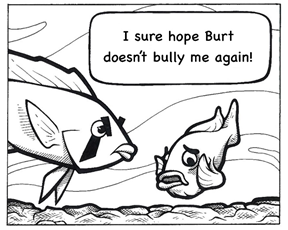OOOooh that smell! Can’t you smell that smell!?
Hello everyone! Today I want to tell you about how I smell my world! You see fish live in water (duh!), which means we constantly smell all of the dissolved odorants that are in the water around us while we swim around. In fact, we use smell for almost everything! I use it for finding food, avoiding becoming food (predator avoidance), navigating, and even finding mates or avoiding other males that may want to fight. Fishes have a sensitive “nose” comprised of an olfactory epithelium full of olfactory receptor neurons (ORNs) that detect all kinds of different smells. Each type of neuron detects a certain “type” of smell. For example, ones called ‘crypt neurons’ detect pheromones (which help me find my special friend Toni! ;)). Each of these different types of ORNs sends signals to a specific region in my olfactory bulb at the very front of my brain. You see, my olfactory bulb is a sorting center for all of these different kinds of smells. From there, the signals go on to other parts of my brain that help me decide how to behave. Should I try to eat this smell, should I do a pretty dance for this smell, or should I swim away from this smell??
Not only can I detect a whole lot of specific smells, but I also send a lot of smells! Especially to Toni, hehe. And Toni sends smells to me, too. You see one way that I communicate with Toni (and other male fish) is through my pee. That’s right! We all pee at each other! Our pee contains lots of molecules that have information on our species, sex, social status, and even reproductive state. So when I see that Toni is ready to spawn, I’ll pee at her more to let her know I am a big strong male with good qualities to pass on to our kids. And Toni pees at me to let me know that she’s ready to spawn. But my pee isn’t just for Toni. If another male wants to try to take over my territory (good luck, buddy!), we will pee at each other to show just how big and strong we are. This helps us assess one another and determine if it’s worth fighting. And Toni pees to other females, too! If she and another female start fighting, she will release pee towards her to show her strength.So, as you might have gathered, smell is SUPER important for me. In fact, if I can only see Toni, and not smell her, I’m much less likely to dance for her, making her less likely to spawn with me. I need to smell her to be sure she’s ready for my dancing. This whole smelling each other thing is super handy in Lake Tanganyika too. Sometimes hippos or other giant wildlife can walk right through our homes, making things very murky and harder for me to see Toni or other males or even food. So having an excellent sense of smell really helps me out.
I hope you enjoyed learning about my awesome sense of smell and how I pee to communicate! If you want to know more, check out these papers on the lab website:
Field, K.E. and K.P. Maruska. (2017). Context-dependent chemosensory signaling, aggression, and neural activation patterns in reproductively-receptive female African cichlids. J Exp Biol. 220: 4689-4702. link
Nikonov, A.N., Butler, J.M., Field, K.E., Caprio, J., and K.P. Maruska. (2017). Reproductive and metabolic state differences in olfactory responses to amino acids in a mouth brooding African cichlid fish. J Exp Biol. 220: 2980-2992. link
Maruska, K.P. and R.D. Fernald. (2012). Contextual chemosensory urine signaling in an African cichlid fish. J Exp Biol 215: 68-74. link






Comments
Post a Comment